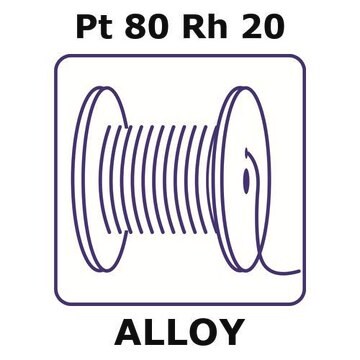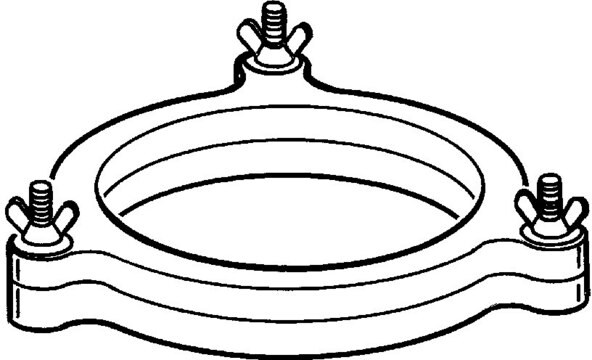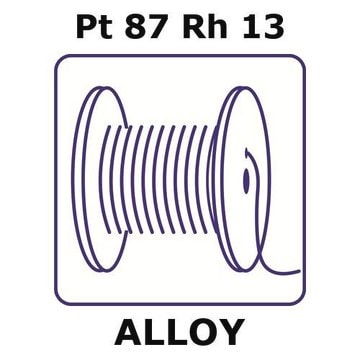GF15807900
Iridium
foil, 0.1m coil, thickness 0.05mm, coil width .5mm, as rolled, 99.9%
Sinonimo/i:
Iridium, IR000201
Autenticatiper visualizzare i prezzi riservati alla tua organizzazione & contrattuali
About This Item
Formula empirica (notazione di Hill):
Ir
Numero CAS:
Peso molecolare:
192.22
Numero MDL:
Codice UNSPSC:
12141720
ID PubChem:
NACRES:
NA.23
Prodotti consigliati
Saggio
99.90%
Forma fisica
foil
Produttore/marchio commerciale
Goodfellow 158-079-00
Resistività
4.71 μΩ-cm
Lungh. × largh. × spess.
0.1 m × 0.5 mm × 0.05 mm
P. eboll.
4130 °C (lit.)
Punto di fusione
2450 °C (lit.)
Densità
22.65 g/cm3 (lit.)
Stringa SMILE
[Ir]
InChI
1S/Ir
GKOZUEZYRPOHIO-UHFFFAOYSA-N
Cerchi prodotti simili? Visita Guida al confronto tra prodotti
Descrizione generale
For updated SDS information please visit www.goodfellow.com.
Note legali
Product of Goodfellow
Certificati d'analisi (COA)
Cerca il Certificati d'analisi (COA) digitando il numero di lotto/batch corrispondente. I numeri di lotto o di batch sono stampati sull'etichetta dei prodotti dopo la parola ‘Lotto’ o ‘Batch’.
Possiedi già questo prodotto?
I documenti relativi ai prodotti acquistati recentemente sono disponibili nell’Archivio dei documenti.
Stephen J Roseblade et al.
Accounts of chemical research, 40(12), 1402-1411 (2007-08-04)
Asymmetric hydrogenation is one of the most important catalytic methods for the preparation of optically active compounds. For a long time the range of olefins that could be hydrogenated with high enantiomeric excess was limited to substrates bearing a coordinating
Paolo Tosatti et al.
Organic & biomolecular chemistry, 10(16), 3147-3163 (2012-03-13)
Since their discovery in 1997, iridium-catalysed asymmetric allylic substitutions have been developed into a broadly applicable tool for the synthesis of chiral building blocks via C-C and C-heteroatom bond formation. The remarkable generality of these reactions and the high levels
Veronica Marin et al.
Chemical Society reviews, 36(4), 618-635 (2007-03-28)
The need for novel materials with luminescent properties and advanced processing features requires reliable and reproducible synthetic routes for the design of suitable materials, such as e.g. polypyridyl ruthenium(II) and iridium(III)-containing polymers. The most popular ligand for those purposes is
Low-valent ruthenium and iridium hydride complexes as alternatives to Lewis acid and base catalysts.
S Murahashi et al.
Accounts of chemical research, 33(4), 225-233 (2000-04-25)
The discovery of a new chemical reaction often leads to new applications and new chemical principles. Low-valent ruthenium and iridium hydride complexes are highly useful redox Lewis acid and base catalysts. Nitriles are activated by these catalysts and undergo reactions
Etienne Baranoff et al.
Chemical Society reviews, 33(3), 147-155 (2004-03-18)
In order to mimic the photosynthetic reaction centre and better understand photoinduced electron transfer processes, a family of compounds has been studied for the past 15 years. These are transition metal complexes, M(tpy)(2) where tpy is a 2,2':6',2" terpyridine based
Il team dei nostri ricercatori vanta grande esperienza in tutte le aree della ricerca quali Life Science, scienza dei materiali, sintesi chimica, cromatografia, discipline analitiche, ecc..
Contatta l'Assistenza Tecnica.








